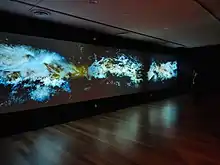Sadia Sadia
Sadia Sadia is a Canadian-born British installation artist, known for her audiovisual media work, incorporating sound and images, both still and moving.
Sadia Sadia | |
|---|---|
 | |
| Nationality | British/Canadian |
| Occupation | Installation artist |
| Website | Chimera Arts |
Education
Sadia received her MSc in Political Science and Economics (Gender, Culture and Society) from Birkbeck, University of London in 1994, MA in Design Studies from Central Saint Martins, University of the Arts in 2001,[1] and PhD in Fine Art from the Royal Melbourne Institute of Technology in 2019.[2] She is a Fellow of the Royal Society of Arts.[3]
Career
Music
From 1978 to 1993, Sadia worked largely with the Canadian guitar player David Wilcox, producing nine albums including Out of the Woods, My Eyes Keep Me in Trouble, Bad Reputation, Breakfast at the Circus, and The Natural Edge, four of which reached gold or platinum status in Canada. These albums also formed the basis of two platinum-selling greatest hits packages 'The Best of...' and 'Over Sixty Minutes With...'.[4][5][6]
In 1993, Sadia co-founded the multimedia world fusion project Equa with Stephen W. Tayler. Signed to Polygram (Australia) in 1996, the band's eponymously titled Equa was nominated for an ARIA award for best world music album.[7]
During the 1990s she sat as the only female director of the British Record Producer's Guild.[8][9]
Film
Sadia produced and edited multiple films working with Anthony Stern. In 2004, Sadia and Stephen W. Tayler as Equa also scored Stern's short film The Noon Gun,[10] which was shortlisted for the Satyajit Ray Foundation short film competition and has been shown in multiple film festivals,[11] including the 2004 Melbourne International Film Festival[12] and the 2007 Portobello Film Festival.[13]
In 2008, Sadia co-directed San Francisco Redux No. 1,[14] an avant-garde short film that premiered at Cinémathèque Française.[15] Sadia also directed, produced and edited a short documentary film on Stern's works titled Lit From Within: The Film and Glass Works of Anthony Stern.[16][15] Sadia produced and edited Stern's The End of the Party: Hyde Park 1969, a view of the 60's based on footage of the first performance by Blind Faith in Hyde Park,[17] and Iggy the Eskimo Girl, a short featuring musician Syd Barrett's girlfriend Iggy.[18]
Installations
Sadia is the creator of the single channel video installation The Memory of Water (Part 1)[19] which was acquired by the Australian Centre for the Moving Image (ACMI) to form part of its permanent collection.[20][21] It was included in the ACMI's exhibition Proof: The Act of Seeing With One's Own Eyes.[22]
_ACMI_internal_and_external_screens_Federation_Square_Melbourne_2004.jpg.webp)
In January 2014, Sadia completed All Time and Space Fold into the Infinite Present (Cataract Gorge)[23] a large-scale three channel filmed installation with an accompanying eight channel soundfield. The work features footage of the rapids captured by the artist in Cataract Gorge, Launceston, Tasmania. The footage has been slowed down and colour balanced to resemble deep space, while the motion remains that of the water. The accompanying eight channel soundfield is constructed of audio captured by the artist in the Gorge.[24] The work premiered at the Queen Victoria Museum and Art Gallery (QVMAG)[25] in Tasmania, Australia, in 2014, and has since been acquired by the museum for their permanent collection.[26][27][21]

In September 2014, Sadia premiered her 30-channel audio installation Notes to an Unknown Lover at Spinnerei Rundgang in Leipzig, Germany.,[28] based on her self-published artist's book with the same title.[29] She also premiered her installation ‘Fugue: Die Wende, created in collaboration with Stephen Tayler and Darren Munce, at Halle 14 Zentrum für zeitgenössische Kunst (Centre for Contemporary Art) as part of the City of Leipzig's Lichtfest 2014 Kulturparcours.[30]
In June 2015, Ghosts of Noise[31][32] was screened and discussed as part of the international colloquium Les Devenirs Artistiques de L’Information at Sorbonne Paris, co-sponsored by Le Bauhaus-Universität Weimar & Internationales Kolleg für Kulturtechnikforschung und Medienphilosophie (IKKM), the Birmingham Center for Media and Cultural Research, and ELICO Equipe de recherche de Lyon.[33][34]
In 2019, Ghosts of Noise[35][36] was exhibited as a four-channel video and eight channel audio installation in The Model Citizen[37] at the RMIT Gallery, Melbourne, curated by Sean Redmond and Darrin Verhagen.[38]
References
- "Sadia Sadia". Chimera. Retrieved 18 September 2021.
- Sadia, Sadia (2019). The sacred ground: enhancing and constructing the transcendent state in the immersive installation environment (Thesis). RMIT University. Retrieved 15 September 2021.
- "Sadia Sadia". Royal Society of Arts. Retrieved 15 September 2021.
- "David Wilcox Discography". davidwilcox.net.
- "Gold/Platinum – Music Canada". Music Canada. Retrieved 9 September 2021.
- O'Brien, Lucy (2003). She Bop II: The Definitive History of Women in Rock, Pop, and Soul. Bloomsbury. pp. 449–450. ISBN 9780826435293.
- "ARIA Awards 1997". Ariaawards.com.au.
- Tingen, Paul (8 February 1991). "The Female Touch: Women Engineers and Producers". Audio Media (8).
- Tingen, Paul (May 1991). "A Question of Sex". Sound on Sound. 6 (7): 40–47.
- "The Noon Gun (2004)". BFI. Archived from the original on 5 August 2016. Retrieved 13 September 2021.
- "Sadia Sadia". liap.eu. Leipzig International Art Programme. Retrieved 13 September 2021.
- "Noon Gun". MIFF Archive. MIFF. Retrieved 13 September 2021.
- "2nd London Film-Makers' Convention". portobellofilmfestival.com. Portobello Film Festival. 2007. Retrieved 13 September 2021.
- "San Francisco Redux No. 1". British Films Directory. British Council. Retrieved 13 September 2021.
- "ANTHONY STERN à la Cinémathèque française". doczz.fr. 27 June 2008. Retrieved 10 September 2021.
- "Lit From Within". Chimera-arts.com.
- "The End Of The Party: Hyde Park 1969". British Films Directory. British Council. Retrieved 13 September 2021.
- "Iggy The Eskimo Girl". British Films Directory. British Council. Retrieved 13 September 2021.
- "The Memory of Water (Part I) (2004)". britishcouncil.org.
- "The Memory of Water (part 1) | S Sadia | 2004 | ACMI collection". acmi.net.au. Retrieved 10 September 2021.
- "Dr. Sadia Sadia: Collections". daao.org.au. Design and Art Australia Online. Retrieved 13 September 2021.
- Proof : the act of seeing with one's own eyes : 09.12.04-13.02.05. John Hartley, Steve Kurtz, Mike Stubbs, Clare Pentecost, Australian Centre for the Moving Image. Flinders Lane, Vic.: Australian Centre for the Moving Image. 2004. pp. 92–93. ISBN 1-920805-07-9. OCLC 64449596.
{{cite book}}: CS1 maint: others (link) - "All Time and Space Fold into the Infinite Present (Cataract Gorge)". Chimera-arts.com.
- "ABC Northern Tasmania Interview". abc.net.au. Archived from the original on 21 March 2016.
- "Queen Victoria Museum and Art Gallery". qvmag.tas.gov.au. Archived from the original on 14 February 2014.
- QVMAG Annual Report 2013-2014, Appendix 2: Major Acquisitions for 2013-14, p. 38. "Sadia Sadia , All Time and Space Fold into the Infinite Present (Cataract Gorge). Optical disc set. Purchased by the QVMAG Arts Foundation with funds from the Turner Ralph Bequest 2014 QVM.2014.FDv.1".
- "Queen Victoria Art Gallery: More images". Tasmania Arts Guide. Retrieved 13 September 2021.
- "Notes to an Unknown Lover". artschimera.com.
- "Notes to an Unknown Lover". bybrookpress.com.
- "Halle 14 Sadia Sadia Echoes and Ashes". Halle 14. halle14.org. Archived from the original on 20 October 2020.
- "Ghosts of Noise". Chimera-arts.com.
- "The Model Citizen". Australian Arts Review. 5 February 2019. Retrieved 13 September 2021.
- "Accueil". Les devenirs artistiques de l'information. 7 May 2015. Retrieved 13 September 2021.
- "Les devenirs artistiques de l information: 46". docplayer.fr. Retrieved 13 September 2021.
Sadia Sadia construit l'installation Ghosts of Noise en 2009 afin de convertir le bruit nocif des informations télévisuelles en un chantier formel. Elle superpose des centaines d heures d images de journaux télévisés en plusieurs dizaines de couches par écran jusqu à donner des formes au bruit.
- "The Model Citizen". 5 February 2019.
- "Sadia Sadia in conversation – her journey to 'Ghosts of Noise'".
- "The Model Citizen".
- "The Model Citizen by RMIT Gallery – Issuu".
External links
- Chimera Arts Official website for Sadia Sadia
- Sadia Sadia at IMDb